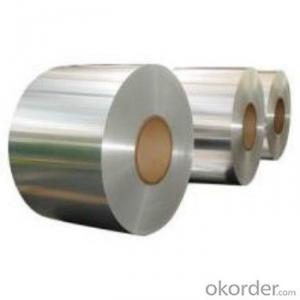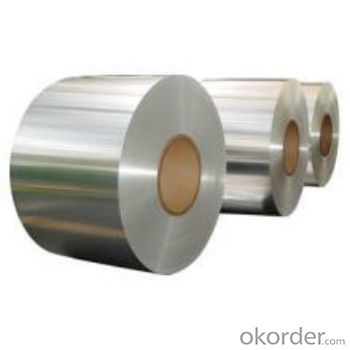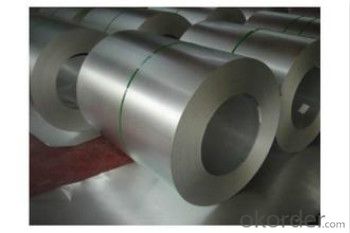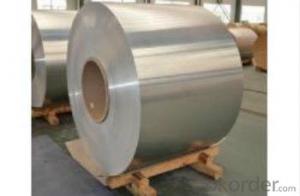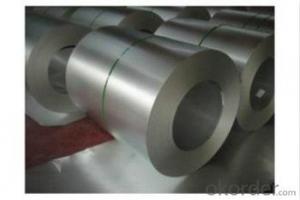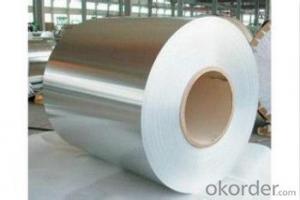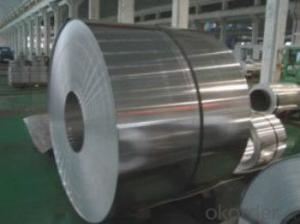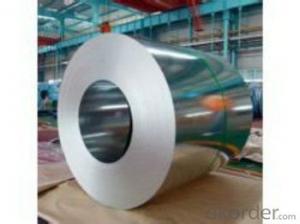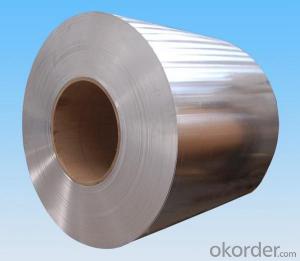Aluminum Coil Fins Mill Finished Aluminium Coil AA1050 Temper H18
- Loading Port:
- Tianjin
- Payment Terms:
- TT OR LC
- Min Order Qty:
- 5 m.t.
- Supply Capability:
- 3000 m.t./month
OKorder Service Pledge
OKorder Financial Service
You Might Also Like
Specification
1. Aluminum Coil Description:
Aluminum coil, is a rolled product, produced in a coiled form of continuous strip, and having an ID (Inner diameter) and OD (Outer diameter).Common alloy coil are used for a wide variety of applications, alloy 1050, 1060, 3003, 3105, 3005, 5052, 5754, 5083, 6061, 8011, 8021, and so on, in thickness from 0.0065-7mm, in width from 300- 2200mm.
2.Main Features of the Aluminum Coil:
• Great ductility
• Heat conductivity
• Anti-corrosion
• Moisture resistanve
3.Aluminum Coil Images
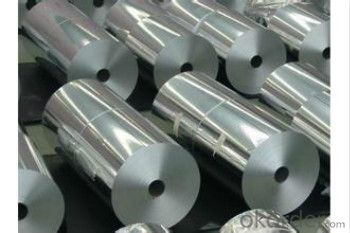
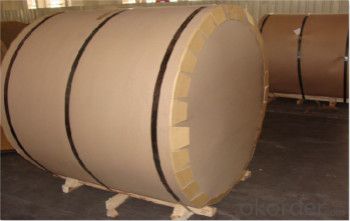
4.Aluminum Coil Specification
Aluminum Coil/Sheet | |
Main Specification | |
Alloy | AA1xxx (AA1050, AA1060, AA1070, AA1100 etc.) |
AA3xxx (AA3003, AA3004, AA3005, AA3105 etc.) | |
AA5xxx, AA6XXX (AA5052,AA5083, AA5754, AA6061, AA6062 etc.) | |
AA8xxx(AA8011, AA8006, AA8079 etc.) | |
Temper | H14,H16, H18, H22, H24, H26, H32,O/F |
Thickmess | ≥0.2mm |
Width | 30mm-2100mm |
Standard | GB/T 3880-2006 |
Special specification is available on customer's requirement | |
5.FAQ
We have organized several common questions for our clients,may help you sincerely:
(1) How to guarantee the quality of the products?
We have established the international advanced quality management system, every link from raw material to final product. we have strict quality test; we resolutely put an end to unqualified products flowing into the market. At the same time, we will provide necessary follow-up service assurance.
(2) MOQ?
For trail order, we accept 5 MT.
(3) Payment term?
30% deposit, balance against the BL copy; 100% L/C at sight
(4) What is the delivery time?
Depends on actual order, around 30 to 35 days
- Q: This question asks for a comparison between steel wires and other materials when used in coilings, highlighting the pros and cons of steel wires.
- <p>The advantages of using steel wires for coilings include high tensile strength, durability, and resistance to corrosion. Steel wires are also cost-effective and widely available. They offer excellent fatigue resistance, making them suitable for applications requiring repeated coiling and uncoiling. Disadvantages include higher weight compared to some alternatives, which can be a concern in certain applications. Steel wires can also be prone to rust if not properly treated, and they may not be as flexible as some other materials, potentially leading to difficulties in handling or installation. Additionally, steel's magnetic properties can be a disadvantage in environments where non-magnetic materials are required.</p>
- Q: What is the tensile strength of aluminum coils?
- The tensile strength of aluminum coils can vary depending on the specific grade and manufacturing process, but it typically ranges from 25,000 to 45,000 pounds per square inch (psi).
- Q: Are aluminum coils suitable for corrosion-resistant applications?
- Yes, aluminum coils are suitable for corrosion-resistant applications. Aluminum has natural corrosion-resistant properties as it forms a protective oxide layer when exposed to air, which prevents further corrosion. Additionally, aluminum can be further enhanced with various coatings or treatments to increase its resistance to corrosion, making it a suitable choice for applications where corrosion resistance is required.
- Q: How to use aluminum sheet to roll a 12m-long aluminum coil with a diameter of 184cm?
- According to project experience, first you should check the specification of the aluminum sheet and then design crafts such as connection method, installation and transportation according to equipment.
- Q: What are the potential applications of coil-laminated aluminum coils?
- Coil-laminated aluminum coils have a wide range of potential applications in various industries. They can be used in the manufacturing of automotive parts, such as body panels and interior components, due to their lightweight yet durable nature. Additionally, they are suitable for building and construction purposes, including roofing, siding, and insulation, as they offer excellent corrosion resistance and thermal conductivity. Furthermore, coil-laminated aluminum coils find use in electrical industries for producing transformers, capacitors, and other electrical components due to their excellent electrical conductivity. Overall, their versatility and desirable properties make coil-laminated aluminum coils valuable in numerous applications across different sectors.
- Q: Can aluminum coils be used for food storage and processing?
- Food storage and processing can indeed utilize aluminum coils. The multitude of advantageous properties that aluminum possesses is what makes it a popular choice in this field. Its lightweight nature, strength, and resistance to corrosion create an ideal environment for maintaining the quality and freshness of food. Aluminum coils are versatile and can be used to manufacture a wide range of equipment like containers, pans, trays, and foil for food storage and processing. Additionally, the excellent thermal conductivity of aluminum enables efficient cooling and heating of food. Its impermeability to light, moisture, and oxygen is also beneficial in preventing spoilage and contamination. In conclusion, aluminum coils offer a reliable and secure option for food storage and processing needs.
- Q: How is an aluminum coil made?
- Aluminum coil rolling, a manufacturing process, is responsible for the production of aluminum coils. The process comprises multiple stages. Initially, molten aluminum is poured into large molds, resulting in the formation of large ingots or billets. These ingots are then heated to increase their malleability. After heating, the ingots are transformed into thin strips through the utilization of heavy machinery called hot rolling mills. The ingots pass through a series of rollers, gradually reducing their thickness while simultaneously increasing their length. This continuous hot rolling guarantees uniform thickness and a smooth surface finish. Following hot rolling, the aluminum strips undergo cooling and subsequent processing. Cold rolling, which involves passing the strips through cold rolling mills, is commonly employed. Cold rolling further decreases the thickness of the aluminum strips, creating the desired gauge or thickness necessary for the final product. To enhance the mechanical properties and surface finish of the aluminum, the cold-rolled coils may undergo additional treatments such as annealing, tempering, or surface treatment. Annealing includes heating the coils to a specified temperature and gradually cooling them to alleviate internal stresses and improve their ductility. Tempering is a similar process, albeit conducted at a lower temperature than annealing. Once the desired properties are achieved, the aluminum coils are typically trimmed, cut, and packaged into coils or sheets, thereby becoming ready for distribution or further fabrication. These coils find extensive use in various industries, including construction, automotive, aerospace, and packaging. Their lightweight nature, corrosion resistance, and exceptional thermal conductivity contribute to their high demand.
- Q: What is the primary function or use of a spring steel wire coil?
- <p>A spring steel wire coil is primarily used for its high elasticity and strength. It is designed to return to its original shape after being deformed, which makes it ideal for applications requiring resilience and durability. Common uses include the manufacturing of various types of springs, such as compression springs, torsion springs, and extension springs, found in automotive suspensions, mechanical devices, and industrial equipment. The coil's properties also make it suitable for applications in furniture, electronics, and other industries where a reliable and consistent force is needed.</p>
- Q: Can aluminum coils be used in the production of aluminum honeycomb panels?
- Aluminum honeycomb panels can indeed incorporate aluminum coils in their production process. To create these panels, aluminum sheets are affixed to a honeycomb core material, typically composed of aluminum as well. The aluminum coils are commonly employed to manufacture the aluminum sheets forming the panels' outer layer. After being rolled into thin sheets, these coils are cut to the desired dimensions and subsequently bonded to the honeycomb core. The utilization of aluminum coils enables the efficient and cost-effective manufacture of aluminum honeycomb panels, as they can be easily molded and processed to meet the necessary shape and size requirements. Moreover, aluminum possesses the qualities of being lightweight and durable, rendering it an optimal selection for fabricating honeycomb panels utilized in diverse industries, including aerospace, construction, and transportation.
- Q: Are aluminum coils suitable for food storage containers?
- Aluminum coils are indeed appropriate for food storage containers. This material is highly favored for such containers because of its many beneficial qualities. To begin with, aluminum is lightweight, which makes it easy to handle and transport. Moreover, it possesses excellent thermal conductivity, allowing for quick heating or cooling, making it perfect for storing both hot and cold food. Additionally, aluminum is resistant to corrosion and does not react with acidic or alkaline foods, ensuring that the taste and quality of the food remain unaffected. Furthermore, aluminum is an environmentally friendly choice as it is sustainable and can be recycled. However, it is worth noting that aluminum containers should be coated with a food-grade lining to prevent any potential interaction between the metal and the food, particularly with acidic foods. In conclusion, aluminum coils are a suitable option for food storage containers due to their lightweight nature, thermal conductivity, resistance to corrosion, and recyclability.
Send your message to us
Aluminum Coil Fins Mill Finished Aluminium Coil AA1050 Temper H18
- Loading Port:
- Tianjin
- Payment Terms:
- TT OR LC
- Min Order Qty:
- 5 m.t.
- Supply Capability:
- 3000 m.t./month
OKorder Service Pledge
OKorder Financial Service
Similar products
Hot products
Hot Searches
Related keywords
